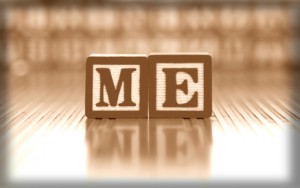By Chris Brady
 There is a saying that I have always liked: “The difference between self-perception and reality is often enormous.”
There is a saying that I have always liked: “The difference between self-perception and reality is often enormous.”
The size of that difference is called a “blind spot.” Unfortunately, we all have them.
Perhaps the way you chew your food drives people crazy. Or maybe you interrupt others constantly and annoy them as a result.
But these examples (and many others I will catalog for some future talk!) are really just foibles; small little mannerisms that we all have that don’t really reflect our character. While it might be helpful for us to identify these blind spots in our mannerisms, these things are not “majors” in and of themselves.
What ARE majors are blind spots of character and relationships?
I see people who live in a world full of blind spots about themselves, and these blind spots cause pain and friction.
Why is it so hard to identify these things in ourselves? I am not sure, but if they were easier to spot, we’d probably call them “fuzzy spots” or something. But blind spots are blind spots because they are truly unobservable to us.
Unless we take the time to look.
Unless we have an open mind to mentorship. Unless we will take responsibility, not only for our own actions, but for the results that surround us in our lives. By looking at such evidence, we are in effect installing a “blind spot mirror” on our life.
What’s the Common Denominator?
Here is what I mean: Let’s say that in most places in your life there is conflict.
You have troubles with your mother. You have a feud going on with your brother. You have had a major fight with your spouse in the past 30 days. You have people who were previously friends who don’t talk to you now.
You have left churches and jobs in the past year or two because of conflict with others. Your children are rebels. Your neighbor is a jerk. Your in-laws are idiots. Your business partners and teammates are driving you crazy.
If you look at results such as these, there is only one conclusion you can make: these people are all to blame! I know, I know, my three dear readers, you are laughing right now because nobody in their right mind could ever come to such a conclusion!
It should be as obvious as the wart on the nose on your face on the front of your skull that the problem in this scenario is the person at the center of it all! But alas, this is why we call it a blind spot! People can actually look at evidence like this and conclude that everybody else is to blame!
There are people (swarms of them, bless their hearts) who are like this and see absolutely nothing wrong with themselves. I often picture their funeral, when people gather around and whisper nice things, but think back to the pain and the hurt and wish it hadn’t been that way.
If only they’d have realized how damaging they were to people. If only they’d realized how abrasive and destructive they were. If only they would have taken responsibility for their results and the impact they were having on the people around them.
If only they would have been open to feedback, to mentoring, to input, to the abstract possibility that they were to blame for the poor results in their life! If only, if only, if only . . . .
This is just one example, and a tragic one, at that. But there are others.
Be Honest With Yourself
Let’s say the evidence suggests a lack of purpose or drive or ambition or hunger or whatever you want to call it. You didn’t get good grades at school, but that was because the teachers were uninspiring. You didn’t do well at your first job, but that was because you were discriminated against for being young.
You didn’t get that promotion, but that’s because you went to the wrong university. You didn’t get that exciting new project, but that’s because someone else was closer to the boss. You didn’t hit that business goal, but that’s because your spouse made other demands on you.
You didn’t attend that big event, but that’s because you had other plans. You didn’t, you didn’t, you didn’t. See the pattern in this one? Is it really the “fault” of all those outside factors, or would the person at the center of this be the cause?
When we lay it out all logically and clinically like this it is so clear. Everybody comes to the same conclusion and shakes their heads at the poor people with blind spots, glad that it is not them. But what I’m here to tell you is that we all have blind spots.
And it is highly possible that our biggest blind spot is thinking that we don’t have one to begin with!
And by the way, our blind spots are usually only invisible to us. EVERYBODY else sees them clearly.
So what is your blind spot? What does the evidence tell you? Take this question seriously, and do something about it. Trust me, people are praying that you will figure it out!
*******************************
 Chris Brady co-authored the New York Times, Wall Street Journal, Business Weekly, USA Today, and Money Magazine best-seller Launching a Leadership Revolution.
Chris Brady co-authored the New York Times, Wall Street Journal, Business Weekly, USA Today, and Money Magazine best-seller Launching a Leadership Revolution.
He is also in the World’s Top 30 Leadership Gurus and among the Top 100 Authors to Follow on Twitter. He has spoken to audiences of thousands around the world about leadership, freedom, and success.
Mr. Brady contributes regularly to Networking Times magazine, and has been featured in special publications of Success and Success at Home. He also blogs regularly at Chris Brady.
He is an avid motorized adventurer, pilot, world traveler, humorist, community builder, soccer fan, and dad.






[…] This post was mentioned on Twitter by Kristina Marie. Kristina Marie said: Are Blind Spots Crippling You? – https://thesocialleader.com/2010/12/blind-spots/ […]